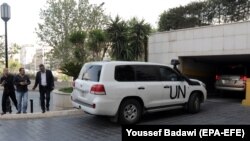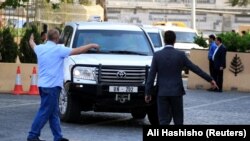On April 16, Russia’s Deputy Foreign Minister Sergei Ryabkov told journalists that inspectors from the Organization for the Prohibition of Chemical Weapons (OPCW) were unable to reach the site of an alleged chemical weapons attack in the Syrian town of Douma because of a lack of coordination with the U.N. Secretariat’s security department. This was after the British delegation to the OPCW tweeted that Russian and Syrian authorities were denying access to the inspection team.
In fact, on April 14, U.N. Secretary General António Guterres issued a statement on the situation in Syria expressing full support for the OPCW inspection.
“I reaffirm my full support for the Organization for the Prohibition of Chemical Weapons – the OPCW -- and its Fact-Finding Mission in undertaking the required investigation,” Guterres said.
“The team is already in Syria. I am informed that their operations plan to visit the site is completed and they are ready to go. I am confident that they will have full access, without any restrictions or impediments to perform their activities,” Guterres added.
U.N. Spokesperson Stephane Dujarric said on April 16: “The United Nations has provided the necessary clearances for the OPCW team to go about its work in Douma. We have not denied the team any request for it to go to Douma.”
On April 7, reports surfaced alleging that Syrian government forces used chlorine gas against civilians in the town of Douma. Initially, Russia and Syria denied any chemical attack had happened. Later, some pro-Kremlin media outlets claimed the attack was staged by Syrian Civil Defense, the group of volunteer search and rescue workers better known as the White Helmets. Both claims were debunked.






